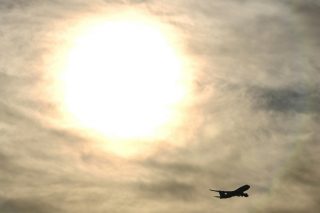African Pilot magazine has warned that SA’s aviation industry is headed for a spectacular crash, claiming that poor accident investigations, bribery and incompetency have sent the c into a tailspin.
According to editor Athol Franz, this impending disaster comes in the face of SACAA’s director of civil aviation Poppy Khoza earning a staggering R5.7 million per year, including R2.1 million in bonuses, more than President Cyril Ramaphosa’s salary of R3.9 million.
“Aviation in SA will fail as it has done in the rest of the African continent. It used to be the best, it used to be the finest in Africa but we are seeing major failures,” he told The Citizen.
He said a 2017 audit carried out in SA revealed that the accident investigation unit shared offices with SACAA in Midrand, and its investigators were paid by the regulator.
“That is illegal according to international standards. The transport department has to establish a separate body that deals with accident investigations. It has to be outside of the SACAA. Since 2017, this was highlighted. It is still not fixed,” Franz said.
He charged that many investigators had no ground practical qualifications, produced factually incorrect reports and that their grasp of English in the reports was often of poor.
Franz said in 1994, it took less than an hour to renew a pilot’s licence but now takes up to 10 days, saying this was despite then-regulator, the Department of Civil Aviation (DCA), having 84 staff members, compared to more than 530 currently.
ALSO READ: SACAA mum on value of landing systems’ calibration contract
But independent aviation expert Phuthego Mojapele said though every organisation had its own challenges, Franz’s criticism was not based on facts but largely on anti-transformation sentiments.
He said before 1994, the aviation industry was the domain of white men who were able to control the industry for the benefit of the white minority and that losing all that power and control has been impossible to swallow.
Currently, 86% of the employees are black (African, Indian and Coloured) and 14% are white.
“It is sour grapes, nothing else. The white minority have not accepted the fact that black people are taking over the aviation space. When we take over the space, we are narrowing the dominance of white people. This is unfair criticism,” Mojapele said.
He said Khoza did not determine her own salary and that SA aviation had grown and evolved, saying comparing current staff numbers with those from the apartheid era was disingenuous.
Kabelo Ledwaba, SACAA spokesperson, said in certain instances South African operators were audited and assessed by qualified and credible global institutions like the International Civil Aviation Organization (ICAO) and the European Union Aviation Safety Agency (EASA).
He said SACAA was assessed and vouched for by its peers from across the world.
“Similarly, the Auditor-General of South Africa [AGSA] subjects the SACAA to operational and financial scrutiny every year, and the results speak for themselves… the narrative that the appointment of female and black personnel equals lower standards or incompetence is an insult of the highest order; and can no longer be tolerated,” Ledwaba charged.
ALSO READ: Aviation authority CEO laments mask-less passengers during airport check
According to the 2019-2020 annual report, just eight years ago SACAA reached 75% of its targets and now reported a 100% performance for six consecutive years and received unqualified audit opinions for six years in a row.
In 2013, ICAO increased SA’s rating from 77.1% allocated in 2007 to 83.83%, following an audit against the eight critical elements of safety audit. In 2017, ICAO’s universal safety oversight audit programme, through its continuous monitoring approach, further increased SA’s rating to 87.41%, placing SA above the global average of around 60%.
For more news your way, download The Citizen’s app for iOS and Android.

